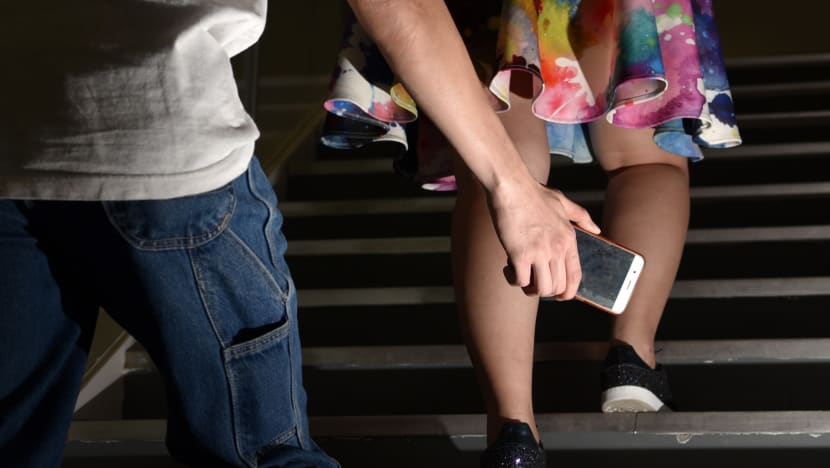commentary Commentary
Commentary: Why would anyone steal underwear – and flout circuit breaker restrictions to do that?
The needs that drive people to such acts, if unchecked, can lead to much more serious sexual crimes, says President of AWARE Margaret Thomas.

An assortment of female underwear was found in his possession. (Photo: Singapore Police Force)
SINGAPORE: One morning in January 1972, early risers at Raffles Hall, the all-male dormitory at the University of Singapore campus at Bukit Timah, found the flagpole at the front of their building festooned with panties and bras.
The Straits Times published a picture of the lingeried flagpole. There was a flurry of follow-up news reports and commentaries, investigations were done, and action was taken against some students.
It was, as far as I know, the last time there was a panty raid on a Singapore campus.
I was then a student at the university and a resident at Eusoff College, the all-female dormitory a 5-minute walk away from Raffles Hall. The underwear strung up on that flagpole belonged to Eusoff women.
WHEN THINGS STARTED TO CHANGE
Panty raids were a thing then, one of several Eusoff-Raffles annual traditions. The women who had their underwear stolen wouldn’t have been too pleased, but generally it was regarded as part of the fun of campus life.
We did not then see those raids as an intrusion into our personal space, as a demonstration of toxic masculinity. We didn’t have the concepts, the language to see it that way.
This was the early 1970s. The women’s movement was well under way in America and Europe, but it would be at least another decade before women in Singapore began to see that these troubling incidents belied a larger problem they needed to do something about.

While the one or two panty raids that took place when I was at Eusoff College may indeed have been just good fun, the sexual underpinnings of the practice showed themselves in a raid in 1967 when some 70 male students stormed the Eusoff corridors. They didn’t just steal underwear; they broke windows and doors and painted pornographic images and words on walls.
I’d forgotten about these panty raids until someone pointed to the recent report about a man with an underwear fetish who, who over a two-year period, had stolen more than 100 bras and 41 panties, and was sentenced to 23 weeks of jail time. It got me thinking about those panty raids of 50 years ago, so I did a little checking.
THE LADDER OF ESCALATION
In January 1972, a Raffles Hall resident wrote to The Straits Times to protest against their coverage of the panty raid. It was harmless, he said, “merely an outlet for pent-up emotions and feelings of depression” of the students who had been studying hard for examinations.
Similar explanations, or excuses, were, I believe, initially offered in some of the recent cases of voyeurism on our campuses.
There is no excuse for acts, whether they are driven by pent-up emotions or depression or a fetish that impinge on the privacy and safety of anyone.
READ: Commentary: Here’s what zero tolerance towards sexual misconduct looks like
READ: Commentary: Terms like ‘lucky boy’ and ‘men will be men’ are problematic double standards
We have every right to possess and practise harmless fetishes, but not fetishes that inflict physical or psychological violence upon others - whether that involves stealing underwear or filming people without their permission in the shower, bedroom or MRT.
We may laugh at the idea of someone climbing over the back gates of homes and sneaking into the laundry area to get to the bras and panties, but the needs that drive this person to such acts can, if unchecked, lead to much more serious sexual crimes.
This is why the last year was so important – it forced our universities to take clear and firm action against voyeurism and other behaviour they had tended to treat too lightly.
But having, and being ready to apply, clear laws and rules is just part of what’s needed to deal with the problem. How do we get these people to change their behaviour? Counselling, behavioural therapy and other treatments are needed.

When your obsession with women’s underwear drives you to go out and steal bras and panties, the fetish becomes a disorder.
Psychiatrists say the disorder often begins in early puberty. As a boy’s sexual urges grow, if he somehow get aroused by underwear and develops an association around the object with sexual pleasure, he may in time develop an overwhelming need for this object and possibly to stealing it, or worse.
READ: Commentary: What’s the problem with a cheer about 'kukubirds'?
LISTEN: TraceTogether token and contact tracing apps: Privacy, data usage and other big questions
SEEKING HELP
Singapore psychiatrist Dr Lim Boon Leng believes early intervention can help.
In an interview last year, he said:
I feel that sex is such a taboo subject that we sometimes underestimate the fact that we need to learn proper sexual practices. Because of that, children and youth may start learning the wrong things maybe from TV, Internet and somehow associate sexual gratification with objects. Having open dialogues about healthy sexual practices may be useful.
Sexuality education in Singapore schools has had a rather chequered history. Schools have over the years sometimes used external vendors to conduct sexuality education programmes, but since 2017 they have relied on the Education Ministry’s programme.
This syllabus is centred on abstinence and notably light on discussion of actual sexual activity (whether intercourse or fetishes). But a responsible and comprehensive sexuality education programme should not be silent on these matters.
READ: Commentary: All this anger over voyeurism but what we need is respect
READ: Commentary: University campuses must be safe places for all
Parents could be more proactive too in the realm of sexuality education. Indeed, MOE’s website states that: “Parents play the primary role in educating their children and are responsible for teaching and transmitting values on sex and sexuality."
Yet AWARE’s experience, from workshops conducted with around 80 parents in 2019, is that many don't know that they are expected to play this primary role. They feel ill-equipped both in terms of knowledge as well as the necessary communication skills required to talk to their kids about sensitive issues such as sex and consent.
Both our Government and our families need to take more responsibility for our children’s healthy development. Everybody in Singapore deserves non-judgmental and helpful discussions about sexual practices, including fetishes.
We are now well into the 21st century. We can’t keep clinging to the excuse that Singapore is still largely a conservative society. We need to talk openly about sex, sexuality and sexual practices.
Margaret Thomas is President of AWARE and a former journalist.














